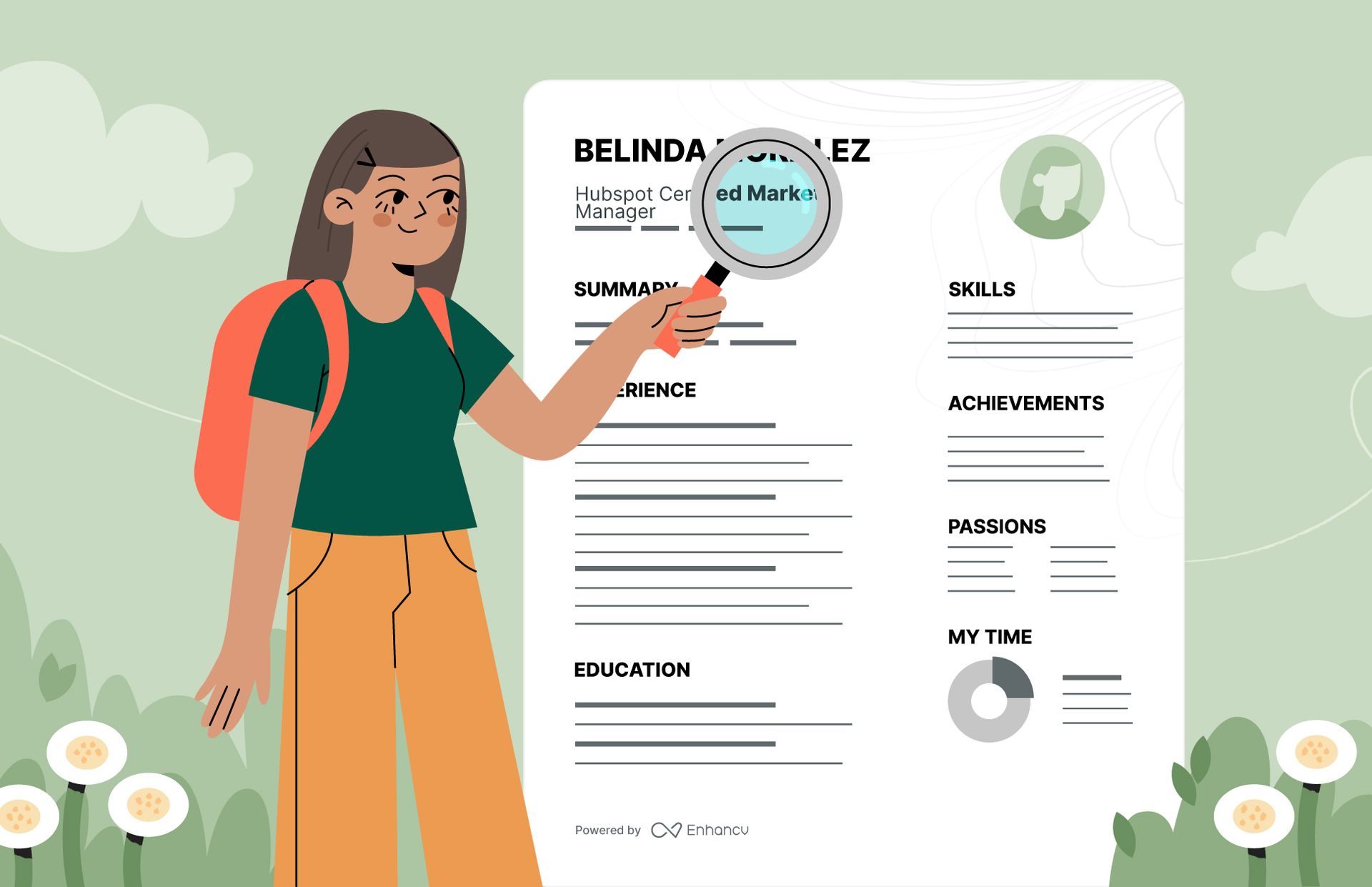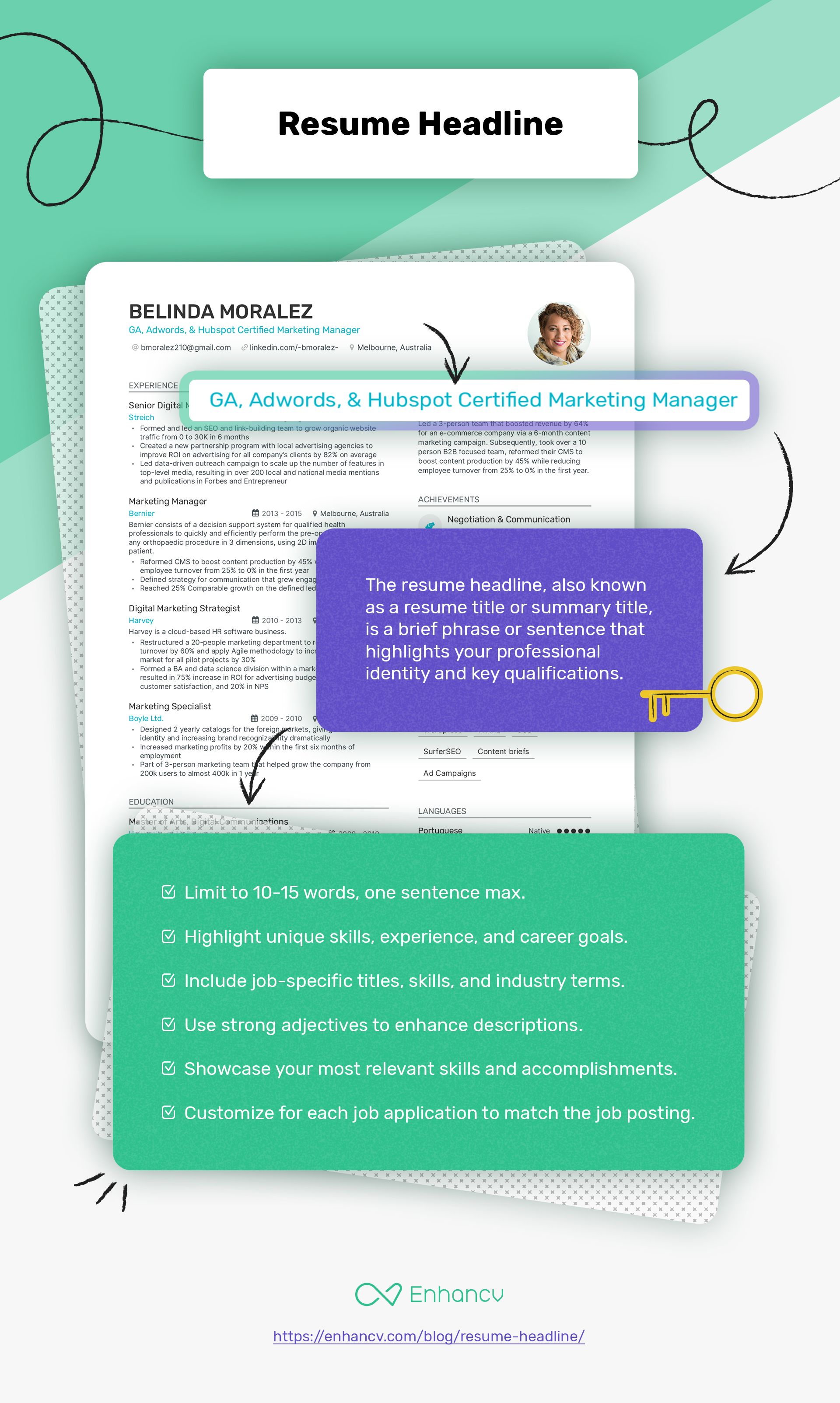In today's competitive job market, making a strong first impression is crucial. One of the most effective ways to capture the attention of hiring managers and recruiters is by using a compelling resume headline.
This short, powerful statement at the top of your resume can set the tone for the rest of your application and help you stand out from the crowd. Among all the strategies for starting a resume, this is an essential one!
In this comprehensive guide, we will explore:
- The importance of resume headlines.
- How to write an effective headline.
- When to include a headline.
- Tips for tailoring your headline to different industries and job roles.
What is a resume headline?
Although not such a complicated topic as resume formats or sections of a resume, the headline holds its own. A resume headline, also known as a resume title or summary title, is a brief phrase or sentence that highlights your professional identity and key qualifications.
It appears in the resume header, just below your name and contact information, and serves as an attention-grabbing introduction to your resume.
Is your resume good enough?
Drop your resume here or choose a file. PDF & DOCX only. Max 2MB file size.
Why is a resume headline important?
- Captures attention: Hiring managers often spend just a few seconds scanning each resume. A well-crafted headline can immediately capture their attention and encourage them to read further.
- Communicates value: Your headline should succinctly convey your professional value and what you bring to the table. It gives a snapshot of your qualifications and career goals.
- Sets the tone: The headline sets the tone for the rest of your resume, providing context and guiding the reader through your qualifications and experiences.
- Enhances searchability: Including relevant resume keywords in your headline can improve your resume’s searchability in applicant tracking systems (ATS) and online job boards.
How to write an effective resume headline
- Keep it concise: A resume headline should be short and to the point, typically no more than one sentence. Aim for 10-15 words that succinctly describe your professional identity and key qualifications.
- Be specific: Avoid generic statements. Instead, focus on your unique skills, work experience, and career goals. Specificity makes your headline more impactful and memorable.
- Use keywords: Incorporate keywords from the job description to make it a more ATS-friendly resume and catch the eye of hiring managers. Focus on job titles, key skills, and industry-specific terms.
- Power adjectives: Using power adjectives on your resume can enhance your descriptions and make your accomplishments stand out.
- Highlight your value: Your headline should communicate what makes you valuable to a potential employer. Highlight your most relevant skills, experiences, and accomplishments.
- Tailor it to the job: Targeting your resume to the job posting is essential in every aspect—so make sure you customize your headline for each job application. Tailoring your headline to the specific role and company shows that you’ve put thought into your application and understand the employer’s needs.
When to leave the resume headline out
A resume headline can be omitted in certain situations, particularly if you feel it doesn't add significant value to your application. Here are some scenarios when it might be a good idea to leave it out:
- Limited space:If you need more room to detail your experience, skills, and accomplishments, adding a headline would make your resume too cluttered or push important information off the first page.
- Objective or summary statement: When you include a detailed career objective or professional summary at the top of your resume, a headline might be redundant. The objective or summary can serve a similar purpose, providing a concise overview of your qualifications.
- Highly specialized job applications: If you are applying for highly specialized roles where your job title and role are already implicitly clear from your experience and the job description, a headline might not be necessary.
- Cover letter emphasis: If you are using a well-crafted cover letter that strongly introduces your candidacy and sets the tone for your resume, a headline might be unnecessary. The cover letter can effectively communicate your key qualifications and career goals.
Examples of strong resume headlines
Dynamic Marketing Manager with 10+ Years of Experience in Digital Campaigns and Brand Strategy
Full-Stack Developer Specializing in JavaScript and Python with Proven Project Management Skills
Top-Performing Sales Executive with a Track Record of Exceeding Targets and Building Client Relationships
Creative Graphic Designer with Expertise in Adobe Creative Suite and a Keen Eye for Detail
Certified Project Manager with 8 Years of Experience Leading Cross-Functional Teams and Delivering Projects on Time
Now let’s check out how to target your headline to a specific industry.
Tailoring your resume headline to different industries
Technology
- Key focus areas: Technical skills, programming languages, certifications, and project management.
Experienced DevOps Engineer with AWS Certification and a Track Record of Optimizing Cloud Infrastructure
Healthcare
- Key focus areas: Clinical skills, certifications, patient care, and specialization.
Registered Nurse with 5+ Years of Experience in Critical Care and Advanced Cardiac Life Support (ACLS) Certification
Finance
- Key focus areas: Financial analysis, regulatory compliance, certifications (e.g., CPA, CFA), and financial management.
Financial Analyst with CPA Certification and Extensive Experience in Corporate Finance and Risk Management
Education
- Key focus areas: teaching experience, curriculum development, student engagement, and certifications.
Dedicated Elementary School Teacher with Expertise in Innovative Curriculum Development and Classroom Management
Marketing
- Key focus areas: Digital marketing, brand strategy, campaign management, and analytical skills.
Results-Driven Digital Marketing Specialist with Expertise in SEO, PPC, and Social Media Strategy
Creative industries
- Key focus areas: Creative skills, software proficiency, portfolio highlights, and innovation.
Innovative Graphic Designer with 7+ Years of Experience in Branding and Visual Storytelling
Human resources
- Key focus areas: Talent acquisition, employee relations, HR software, and compliance.
Strategic HR Manager with 10 Years of Experience in Talent Acquisition and Employee Development
Tips for crafting a standout resume headline
- Focus on achievements: Highlight specific achievements that demonstrate your value. For example, "Award-Winning Sales Manager with a Record of Increasing Revenue by 20% Annually."
- Showcase relevant skills: Emphasize skills that are directly relevant to the job you’re applying for. For example, "Skilled Data Scientist with Expertise in Machine Learning and Data Visualization."
- Include metrics: Quantify your accomplishments to provide concrete evidence of your abilities. For example, "Project Manager Who Successfully Delivered Projects Worth $1M+ on Time and Within Budget."
- Stay professional: Ensure your headline maintains a professional tone. Avoid jargon or overly casual language.
- Be honest: Accurately represent your skills and experiences. Misleading or exaggerated statements can harm your credibility.
Common mistakes to avoid
- Being too vague: Avoid generic statements like "Hardworking Professional Seeking New Opportunities." Specificity is key.
- Using clichés: Steer clear of overused phrases such as "Results-Oriented" or "Team Player." Instead, provide concrete examples.
- Overloading with keywords: While keywords are important, avoid stuffing your headline with too many. Focus on the most relevant ones.
- Ignoring the job description: Tailor your headline to each job you apply for. A one-size-fits-all approach is less effective.
- Being too lengthy: Keep your headline concise. Long-winded headlines can be overwhelming and less impactful.
How to test and refine your resume headline
- Get feedback: Ask friends, colleagues, or mentors to review your headline. They can provide valuable insights and suggestions for improvement.
- A/B testing: If you’re applying to multiple jobs, try using different headlines and track which ones yield better results.
- Use online tools: Utilize online resume builders and optimization tools that can analyze your headline for effectiveness and ATS compatibility.
- Stay updated: Regularly update your headline to reflect new skills, experiences, and career goals.
Now, many of you may be asking, "What if I don’t have any experience?" No worries—where there’s a will, there’s a way.
Writing a resume headline with no work experience
Creating a resume without work experience or if you are an entry-level candidate can be challenging, but by focusing on one element at a time, you can craft a strong application. Start with your resume headline, as it's the first thing potential employers will notice.
Besides the advice already given above, here are a few more tips to craft an effective resume headline for those lacking professional experience:
- Highlight relevant education and training
If you have completed any relevant courses, certifications, or training, mention them in your headline, then go into more detail within your education and certification section.
- Emphasize soft skills
Soft skills are highly valued by employers and can be a strong focus in your resume headline.
- Mention any volunteer or extracurricular experience
Volunteer work and participation in extracurricular activities can demonstrate your work ethic and other relevant skills.
- Show enthusiasm and willingness to learn
Employers appreciate candidates who are eager to learn and grow. Highlight your enthusiasm for the industry or role.
Sample resume headlines for people with less experience
- "Recent Computer Science Graduate with Strong Programming Skills"
- "Highly Organized and Motivated Recent Graduate with a Passion for Environmental Conservation"
- "Dedicated and Detail-Oriented Entry-Level Financial Analyst"
- "Creative and Results-Driven Recent Graduate with Experience in Digital Marketing"
- "Customer Service-Oriented Individual with Strong Communication Skills Seeking Retail Position"
By focusing on your strengths, relevant skills, and enthusiasm for the industry, you can create a compelling resume headline that catches the eye of potential employers, even without direct work experience.
What’s the difference between a headline, a job title, and a profile?
Understanding the differences between a resume headline, a job title, and a resume profile is crucial for effectively structuring your resume. We assume that it’s clear now what a resume headline is, so let’s look at the other two and their specific roles in your resume:
Job title
The job title refers to the specific position you hold or held in your previous or current employment. It indicates your role within a company and is typically listed under each employment entry in the work experience section. Job titles help to clarify your level of responsibility and the nature of your work.
Example:
Senior Marketing Manager
Resume profile
A resume profile, also known as a professional summary or objective statement, is a concise summary of your career goals, skills, and experiences. It provides a more detailed introduction to your resume, often in short paragraph form, and elaborates on what makes you a strong candidate for the job you are applying for.
Key differences
- Resume headline: A brief, attention-grabbing phrase summarizing your professional identity and key strengths.
- Job title: A specific designation indicating your role within a company, listed in the work experience section.
- Resume profile: A detailed, often paragraph-long introduction summarizing your career goals, key skills, and relevant experiences.
Placement on the resume
- Resume headline: Placed at the top of your resume, just below your contact information.
- Job title: Listed within each employment entry in the work experience section.
- Resume profile: Placed at the top of your resume, below the headline (if included) or contact information, serving as an introductory paragraph.
By understanding and appropriately using each of these elements, you can create a resume that clearly and effectively communicates your qualifications and career aspirations.
Key takeaways
Crafting a compelling resume headline is crucial for capturing hiring managers' attention and conveying your professional value, significantly enhancing your job search. Keep it concise, specific, and tailored to the job, and ensure it fits your personal brand. A strong headline can set the stage for a standout resume, leading to more interviews and better job opportunities.
Here are a few key takeaways from the article:
- A well-crafted resume headline immediately captures hiring managers' attention and encourages them to read further.
- Your headline should convey your professional value and key qualifications in a concise manner.
- Incorporate relevant keywords from the job description to enhance compatibility, improve searchability, and impress recruiters.
- Tailor your resume headline to each specific job application to show you've put thought into your application.
- It’s not always necessary to include a headline—be sure it’s needed.
- Avoid vague statements, clichés, and overly lengthy headlines to maintain impact and professionalism.
- If you don’t have the work experience necessary, focus your headline on your strengths, relevant skills, and enthusiasm.
- Familiarize yourself with the different nuances between a headline, a job title, and a resume profile.
Make one that's truly you.





